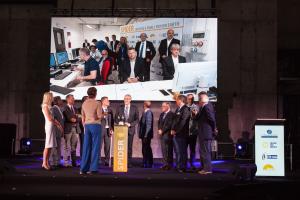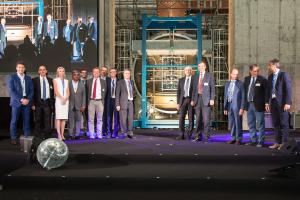As the music of Vivaldi played in the background, a thick concrete door opened to review the SPIDER vessel and beam source. When the microphone was handed around, pride in the first-of-kind technological achievement—as well as in the success of the international collaboration that made it possible—was tangible.
"I am really proud to see this achievement," said the ITER Director-General. "As you know we are committed to deliver, and the most important for us is to keep the trust of all the stakeholders. When we complete something on time, according to specification and schedule, it is the best possible outcome."
SPIDER is one of two test beds planned on the ITER Neutral Beam Test Facility in Padua. All contributions are voluntary (i.e., outside the scope of in-kind contributions to the ITER Project): Italy and Consorzio RFX have provided the facility and a large contribution towards the personnel; the European Domestic Agency has financed and procured most of the components, building on the expertise of European industry and research organizations; the Indian Domestic Agency has contributed the calorimeter and the acceleration grid power supply; and the ITER Organization is responsible for the design and oversight.
See this webpage for full information on the experiments planned at PRIMA.
View a video prepared for the inauguration in this week's Newsline, or click here. A brochure on SPIDER can also be downloaded here.




